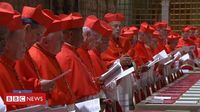The conclave, the secret meeting of cardinals in the Vatican that will elect the successor to Pope Francis, began on Wednesday, May 7, 2025. Cardinal Dom Sérgio da Rocha, the archbishop of the Archdiocese of São Salvador da Bahia and primate of Brazil, is among the seven Brazilian cardinals eligible to vote and potentially become the next pope.
Pope Francis passed away on April 21, 2025, prompting the need for a new leader for the Catholic Church. The conclave, which is an electoral process that has remained virtually unchanged for about 800 years, involves cardinals under the age of 80, who will gather in the Sistine Chapel to deliberate in absolute secrecy.
Currently, there are 135 cardinals eligible to vote, but only 133 will participate due to health issues affecting two cardinals. The process began with a mass in the Basilica of St. Peter, followed by the cardinals taking an oath of secrecy before entering the conclave.
Dom Sérgio da Rocha is highlighted as a key candidate, having been named one of the favorites by the French newspaper Libération. He has a long history of service within the Church, having been appointed a cardinal by Pope Francis in 2016, and is recognized for his commitment to social issues and pastoral care.
Born in Dobrada, São Paulo, in 1959, Dom Sérgio was ordained a priest in 1984 and later became the metropolitan archbishop of Brasília in 2011. He has served as president of the National Conference of Bishops of Brazil (CNBB) from 2015 to 2019 and was appointed archbishop of Salvador in 2020, a title that grants him the honor of being the primate of Brazil.
In addition to Dom Sérgio, the other Brazilian cardinals participating in the conclave include:
- Dom Odilo Scherer - Archbishop of São Paulo, he was appointed cardinal by Benedict XVI in 2007. At 75 years old, he has significant experience in inter-religious dialogue and social issues.
- Dom João Braz de Aviz - The archbishop emeritus of Brasília was appointed cardinal by Benedict XVI in 2012. Now 78, he has served in various significant roles within the Vatican.
- Dom Orani João Tempesta - The archbishop of Rio de Janeiro, appointed cardinal by Pope Francis in 2014, has been active in pastoral work and large religious events.
- Dom Paulo Cezar Costa - The youngest of the Brazilian cardinals at 57, he has been the archbishop of Brasília since 2019 and was made cardinal in 2022.
- Dom Jaime Spengler - Archbishop of Porto Alegre and cardinal since 2024, he has been involved in social and political issues in Brazil.
- Dom Leonardo Ulrich Steiner - The archbishop of Manaus and the first cardinal from the Amazon region, he was appointed in 2022 and is known for his advocacy of environmental issues.
As the conclave progresses, the cardinals will engage in multiple rounds of voting, with the aim of reaching a two-thirds majority for a candidate. Initial votes may yield black smoke, indicating no decision has been reached, while white smoke will signify the election of a new pope. The first round of voting is expected to take place soon after the conclave begins.
The conclave is expected to last several days, with the possibility of a new pope being elected within 48 to 72 hours based on historical trends. The anticipation surrounding this conclave is heightened by the diversity of candidates and the potential for a significant shift in the direction of the Catholic Church.
Dom Sérgio, in recent interviews, has emphasized the importance of respecting the legacy of Pope Francis while expressing hope that the Holy Spirit will guide the electing cardinals in making the decision that aligns with God’s will for the Church. He stated, "At this moment, we don’t have much to say about the conclave; we must focus on what we can say about Pope Francis. The conclave is in God’s hands. Certainly, the Holy Spirit will guide the electing cardinals to make the decision that God wants for the Church."
As the world watches, the conclave stands as a critical moment not only for the future of the Catholic Church but also for the representation of Brazil on the global stage. The outcomes of this conclave could shape the Church's approach to numerous contemporary issues, reflecting the diverse perspectives and experiences of the cardinals involved.





